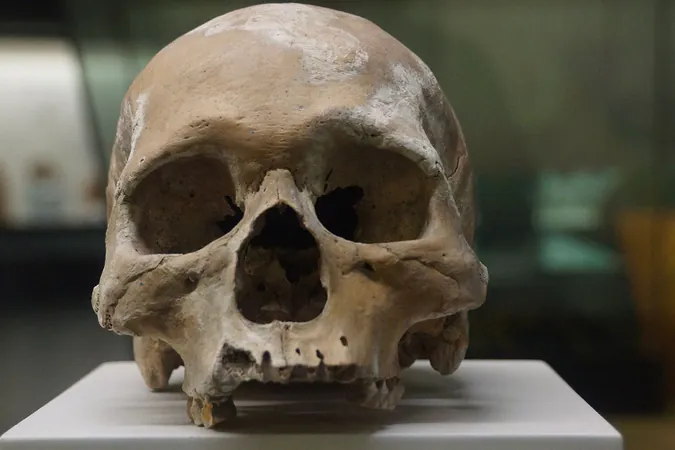
Shocking Discovery: Ancient Teeth Reveal Secrets of Our Cavities and Diet Transformation!
2025-01-06
Author: Ying
Tooth decay and ancient diets
Tooth decay, commonly known as dental caries, continues to plague modern society, despite the availability of advanced dental care products. Interestingly, our prehistoric ancestors seemed to suffer far less from cavities—raising questions about how our diets have dramatically reshaped our oral health over millennia.
Unveiling Ireland’s Bone-Chilling Past
In an astonishing archaeological discovery in County Limerick, Ireland, researchers stumbled upon two 4,000-year-old teeth belonging to a Bronze Age individual. Excavated from a limestone cave between 1993 and 1996, these teeth have provided unique perspectives on ancient oral bacteria—even after thousands of years buried in the earth.
What surprised scientists most was the presence of Streptococcus mutans, a notorious bacterium linked directly to the formation of cavities. Despite the teeth showing intact enamel, the detection of S. mutans suggested potential for decay. Unfortunately, the chaotic remains made it challenging to determine if other decayed teeth belonged to the same individual.
Why Finding Streptococcus mutans Is Groundbreaking
The discovery of this bacterium in prehistoric specimens is notably rare. S. mutans typically wreaks havoc on DNA with its acidic by-products, making it difficult to preserve in ancient remains, especially considering the low-sugar diets of early humans before agricultural practices were widespread.
Previously, researchers identified trace amounts of S. mutans in a Neolithic tooth from southern France and even ancient Scandinavian chewing gum, highlighting the significant dietary shifts that have influenced oral bacteria over thousands of years.
The Striking Dietary Shifts and Bacterial Evolution
The research emphasizes the significant impact of dietary changes on the evolution of S. mutans over centuries. The introduction of refined sugars dramatically aided the survival of this cavity-causing bacterium in our mouths. Notably, the bacterium's proliferation surged after the medieval period owing to significant changes in dietary habits.
Comparative studies indicate that the expanded availability of refined sugar during the 19th century was closely correlated with the rise in cavity occurrences. Furthermore, the transition to farming and the consumption of cereals around 10,000 years ago also prompted an increase in dental decay rates.
Our Evolving Oral Microbiome
A study from Nature Genetics back in 2013 revealed that dietary changes over time have dramatically altered the composition of our oral microbiomes. More harmful bacteria such as S. mutans have gradually taken over from previously friendly species that maintain a healthier balance in our mouths. In addition to S. mutans, Tannerella forsythia—often associated with gum disease—was found, displaying a significant diversity in ancient microbiomes compared to what we observe today.
The Implications for Modern Health
This decline in microbial diversity is alarming when considering the broader implications for human health. The prehistoric oral microbiomes were far richer than our contemporary equivalents, which may help explain the rise of various diseases prevalent in Western populations today.
Experts like Lara Cassidy from Trinity College Dublin stress the urgent need to understand how diet transformations impact both oral and gut microbiomes. The insights gleaned from such research are vital in addressing the health issues rooted in microbial imbalances that are exacerbated by modern sugary and processed foods.
Louise Humphrey from London's Natural History Museum succinctly urges a deeper reflection on our dietary choices: "Higher caries rates correlate with increased availability"—an essential reminder that the choices we make today could profoundly affect not only our health but that of future generations.
The investigation into ancient dental health does more than just illuminate our history; it empowers us to understand the fundamental principles of healthy living amidst the changing tides of modern diets. Are we prepared to rethink our nutritional choices for the sake of a healthier tomorrow?

 Brasil (PT)
Brasil (PT)
 Canada (EN)
Canada (EN)
 Chile (ES)
Chile (ES)
 Česko (CS)
Česko (CS)
 대한민국 (KO)
대한민국 (KO)
 España (ES)
España (ES)
 France (FR)
France (FR)
 Hong Kong (EN)
Hong Kong (EN)
 Italia (IT)
Italia (IT)
 日本 (JA)
日本 (JA)
 Magyarország (HU)
Magyarország (HU)
 Norge (NO)
Norge (NO)
 Polska (PL)
Polska (PL)
 Schweiz (DE)
Schweiz (DE)
 Singapore (EN)
Singapore (EN)
 Sverige (SV)
Sverige (SV)
 Suomi (FI)
Suomi (FI)
 Türkiye (TR)
Türkiye (TR)
 الإمارات العربية المتحدة (AR)
الإمارات العربية المتحدة (AR)